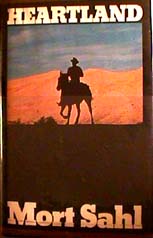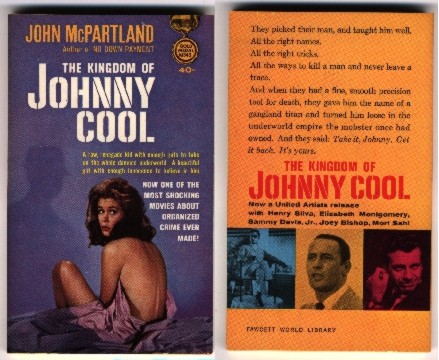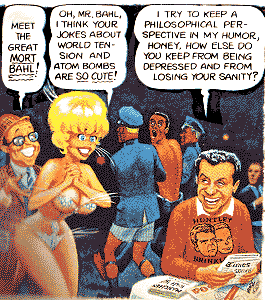|
I made the mistake early in my career, when I moved to Hollywood, of being attracted to actresses. I used to go out exclusively
with actress and all other female impersonators. First of all, let's get sex out of the way. It's kind of like a date. Let's
get that out of the way first, and then we can talk. First of all, if you can talk after sex, you really have something big
going. Sex is impersonal. The con job done on young guys in this culture is amazing, convincing them of this great gift that
women can give you. Actually, it's the least they can give you. If people don't want to get personal, they get you on a physical
basis and that keeps you at arm's length.
The fact is that you can't have a good relationship with a girl who hasn't settled things with her father. All girls answer
as follows: "Well, what about guys who don't settle things with their mothers?" That's not as crucial to me, because
I'm not looking for a guy. The thing is that women, if they could look at their fathers objectively, and make an estimate
of them, and see where they failed, and forgive them and forget them, they'd be all right. Because they haven't settled things
with them, men become the road company of their fathers. "He never paid any attention to me, either." You've got
nothing but trouble. The thing about women is that they don't discriminate. Even though they hate you and they think you're
insensitive, they won't let on, and they'll marry you and punish you.
Women also have a great weakness that we don't have. You know, they keep saying in the Movement that they're the same
as we are. But they're not the same. For instance, I don't think that women think about honor as anything but a weakness.
Women are not romantic and have no mercy. When a woman is cold, she'll cancel you out of the human race. A nurse from the
third floor of a hospital, when you call to ask about a patient who is in Intensive Care, is more personal and will give you
more of her time than a woman who has lived with you for five years and decided she doesn't want to anymore so that she can
be fulfilled.
Fulfillment for a woman is like graduating in psychiatric social work. Fulfillment for a woman is to test. Steve Allen
and the people, the Committee for Nuclear Policy, would say, "For God's sake, stop the testing." Women are always
testing. They want to see how far they can go. Do you know when they're fulfilled? When you tell them not to go any further
or you'll brain them. That's when they really think they've found a safe harbor. It's sad that it has to be that primitive.
But in a woman's eyes a man's sensitivity will never be valued the way his strength is.

The New York Times had two reviewers trash it. First came a frontal assault in the daily edition on September 13. In the
Sunday edition on October 3, the Times recruited Jean Shepherd for the stab in the back. Yes, the same Jean Shepherd who jealously
performed a routine on his 1960 album "Foibles" complaining about Sahl's ability to get big laughs with quick, hip
allusions.
Newsweek, August 9th, was typical of the mixed notices at the time:
"Mort Sahl is a funny man about politics, but his political humor has caused him some serious problems. In his autobiography,
'Heartland,' to be published next month, Sahl portrays himself as a double casualty of the Kennedy years. As a result of his
attacks on John F. Kennedy, he claims, the Kennedy Mafia turned on him: suddenly he couldn't get work, his agency refused
to handle him and his income dropped from $1million a year to $13,000. Ironically, the so-called blacklisting intensified
when he refused to believe the Warren commission report on the Kennedy assassination and started working to discredit it with
former New Orleans D.A. Jim Garrison. Still a fanatic on the subject, Sahl is convinced that a media conspiracy of silence
has kept the Kennedy assassination from being investigated. In the book's angry rantings on the subject, the salty Sahl wit
is submerged in bitterness. "Hitler said that he always knew that you could buy the press," he writes. "What
he didn't know was you could get them cheap."
The book is fascinating, insightful and inciteful. And yes, it's bitter at times. But it's also funny. From the back cover:
True stories are the funniest, and I hope to include all of them without mercy. Because you don't need mercy. You need
justice. The Christians confuse you with mercy. The Jews want to bring you justice.
I used to go out exclusively with actresses and all other female impersonators.
No matter who the Democrats nominate, the liberal's position is, "Well I don't know who he is but he might work out."
It's reverse English; it's like being pregnant and then trying to fall in love.
With Nixon's departure we witnessed the second assasination of a President by the CIA in ten years.
Don't appeal to the intellectuals. The hope of America is the heartland.

MORT ERRATA
Several pages of bio material on Mort appears in: "Stars of Stand-Up" by Ronald L. Smith. Charles Champlin in the
Los Angeles Times..."He is very good and comprehending on Lenny Bruce...and Smith's long entry on Mort Sahl captures
remarkably the incisive style of a comic satirist...there are two kinds of reference books about show business: very good
and fairly awful...good ones answer hard questions, surprise you with facts you didn't know and are impossible to put down
because one revelation leads to another..."
Mort, along with S.J. Perelman and Groucho Marx, supplied endorsements for "Scuffler" a 1974 book by Harvey
Orkin.
A TV Guide essay re-appeared in the hardcover anthology "TV Guide Roundup."
Mort supplied the forward for "Burn This," a book that collected "hip" greeting cards, and also supplied
a forward for "Stan Kenton Artistry in Rhythm" by Dr. William F. Lee. It was from Creative Press (1980). Said Mort:
"We are all his children".
Mort contributed to VOICES FROM THE SIXTIES: Twenty-Two Views of a Revolutionary Decade - In the Words of the People Who
Helped Shape It. The book was edited by Pierre Berton and arrived in 1966 via Doubleday. He's also in "The Best of the
Realist" from Running Press.
Mort was on the back cover of "The Kingdom of Johnny Cool" a movie-tie-in novel (1963, Gold Medal) by John McPartland.
He was also on the cover of the tie-in novel for "All The Young Men."
Mort's article "The Critic," was reprinted in the hardcover "Esquire's World of Humor" over a two-page
spread.
The anthology of the Kurtzman-Elder "Little Annie Fanny" comics (which appeared in the back pages of PLAYBOY)
does include a cameo from Mort...

|

